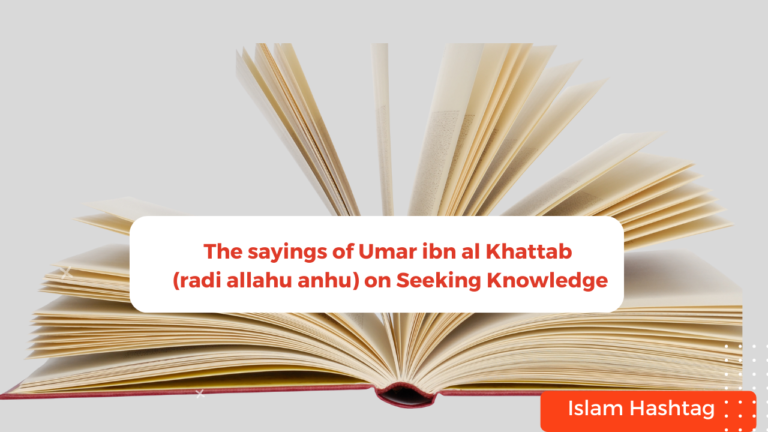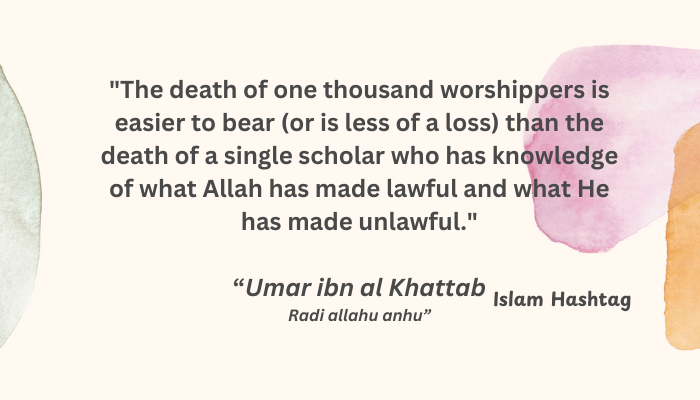The sayings of Umar ibn al Khattab (radi allahu anhu)on Seeking Knowledge
Umar ibn al-Khattab (radi allahu anhu), the second Caliph of Islam, was renowned for his wisdom, knowledge, and deep understanding of Islam. His sayings on knowledge reflect the importance of seeking and acting upon knowledge for the sake of Allah.
Ramadan Offer
Umar (radi allahu anhu) not only valued knowledge as a source of enlightenment but also saw it as a shield against ignorance, pride, and misguidance. Here are some of his profound sayings that inspire the pursuit of Islamic knowledge and wisdom.
1. The Power of Repentance through Knowledge
ʿUmar (radi allahu anhu) beautifully emphasized the transformative power of knowledge when he said:
“Verily, a man leaves his home while carrying the burden of [past] sins that are equal [in magnitude] to the mountains of Tihaamah; but then, if he hears knowledge [in a study circle (for instance)], he becomes fearful [of Allah], he returns [from his misguided ways], and he repents. Then he returns to his home free from the burden of any sins (for he has been forgiven). So do not stay away from the gatherings of scholars.”
This saying highlights the mercy of Allah and the role that knowledge plays in leading a person to repentance. When one attends gatherings where knowledge is being shared, it softens the heart, instills fear of Allah (SWT), and brings a person closer to sincere repentance. Such gatherings are not just places for intellectual discussions but opportunities to transform one’s soul, cleanse past sins, and return to Allah with a purified heart.
2. The Characteristics of a True Scholar
ʿUmar (radi allahu anhu) laid out the essential traits of a scholar, reminding us that knowledge is not merely intellectual, but moral and spiritual. He said:
“A man does not become a scholar until he is not jealous of those above him, does not look down upon those below him, and does not take payment for his deeds.”
A true scholar, according to ʿUmar (radi allahu anhu), is someone free from jealousy, arrogance, and materialism. A scholar must avoid comparing themselves to others, whether those with more knowledge or less. Moreover, the scholar should impart knowledge sincerely for the sake of Allah, not seeking worldly rewards. This teaches us that knowledge should elevate one’s character, making a person humble, generous, and sincere.
3. Knowledge Before Leadership
ʿUmar (radi allahu anhu) also warned against the dangers of leadership without proper understanding of the religion:
“Gain an understanding of the Religion before you become leaders [of your people]; for if you do not, pride will [likely] prevent you from learning, and you will end up living as ignorant people.”
Sometimes a short pause to remember Allah brings clarity and steadiness back into our day. These reflections are simple reminders from my own journey.
This saying encourages every Muslim, particularly those in positions of influence, to seek knowledge before assuming leadership roles. Without a strong foundation in knowledge, pride can take over, preventing leaders from seeking further education. A lack of understanding leads to ignorance and ultimately misguidance of those they lead.
4. The Inherent Benefit of Knowledge
ʿUmar (radi allahu anhu) reassured the value of knowledge, even if its immediate benefits are not apparent:
“Knowledge is such that, if it does not benefit you [in this life], then at least it will not hurt you.”
While the acquisition of knowledge may not always bring immediate worldly benefits, it remains valuable because it does no harm. Knowledge safeguards against ignorance, helps guide decisions, and brings a person closer to Allah (SWT). Even if one does not see its immediate effects, it will eventually bear fruit, either in this life or in the Hereafter.
5. The Loss of a Scholar
The importance of scholars and their irreplaceable role in society is captured in this profound saying:
“The death of one thousand worshippers is easier to bear (or is less of a loss) than the death of a single scholar who has knowledge of what Allah has made lawful and what He has made unlawful.”
Scholars are the bearers of knowledge, guiding the community on what is lawful and unlawful according to the Qur’an and Sunnah. Their loss is a great calamity because worshippers, while valuable, do not have the ability to guide the ummah with the same depth and understanding that scholars possess. This highlights the critical role of scholars in preserving the religion.
6. The Memorization of the Qur’an and Humility
ʿUmar (radi allahu anhu) advised Muslims to memorize the Qur’an and maintain a humble disposition:
“Be like containers who have in them (who have committed to memory) the Book [of Allah], and be sources of knowledge. Also, ask Allah (SWT) for sustenance one day at a time, and it will not harm you if you are not given much [in terms of sustenance].”
This saying emphasizes the importance of committing the Qur’an to memory, being vessels of knowledge, and relying on Allah for sustenance. Humility and trust in Allah should be the companions of knowledge seekers, as both are essential for maintaining sincerity and purpose in seeking knowledge.
7. Humility in Teaching and Learning
ʿUmar (radi allahu anhu) stressed the importance of humility when seeking and imparting knowledge:
“Learn knowledge and teach it to the people. Learn how to have about yourselves an aura of dignity and peace. Be humble to those that have taught you knowledge, and be humble to those that you have taught knowledge. And do not be haughty scholars; otherwise, your knowledge will not rise due to your ignorance [which will weigh you down].”
Humility is a vital trait for both students and teachers. Arrogance in scholars can destroy the potential benefit of their knowledge. By maintaining humility, scholars and students alike ensure that their knowledge brings them closer to Allah rather than leading to self-aggrandizement or misguided pride.
8. The Dangers of Ignorance in Leadership
Lastly, ʿUmar (radi allahu anhu) warned against the destruction caused by ignorant leaders and scholars who lead people astray:
“Islam becomes destroyed by the error of a scholar, by the argumentation of a hypocrite regarding the Qur’an, and by Imaams who lead people astray.”
This statement warns of the grave danger posed by errors in religious understanding. Misguidance by scholars or leaders can lead to the spiritual downfall of an entire community. Therefore, it is essential for scholars to ensure they teach the truth, avoiding personal opinions that conflict with the Qur’an and Sunnah.
Conclusion
The sayings of ʿUmar ibn al-Khattab (radi allahu anhu) emphasize the centrality of knowledge in the life of a believer. He stressed the importance of humility, sincerity, and continuous learning, while also warning of the dangers of ignorance, arrogance, and misguidance. His wisdom encourages us to seek knowledge, teach it to others, and live by its principles. May Allah grant us the understanding and sincerity to pursue knowledge for His sake.
Reflection from Book: Stories of Umar ibn Al Khattab (radi allahu anhu)
Join our Quran Tafsir class for FREE
Discover more from Islam Hashtag
Subscribe to get the latest posts sent to your email.








